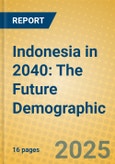The Future Demographic reports provide in-depth data and analysis of population changes in 85 countries, 7 regions and a world overview. The reports offer long-term demographic forecasts to 2030, and include breakdowns of population by age and sex, vital statistics and major cities. The series provides insight into demographic trends which will shape consumer segmentation and markets in the future
Data coverage: Market sizes (historic and forecasts), company shares, brand shares and distribution data.
Why buy this report?
- Get a detailed picture of the Future Demographics market;
- Pinpoint growth sectors and identify factors driving change;
- Understand the competitive environment, the market’s major players and leading brands;
- Use five-year forecasts to assess how the market is predicted to develop.
Table of Contents
- Introduction
- Key Findings
- Summary
- Indonesia and the World in 2040
- Ageing
- Men and Women
- Marriage and Divorce
- Births and Fertility
- Life Expectancy and Deaths
- Health
- Migration
- Diversity
- Urbanisation
- Population Segmentation








